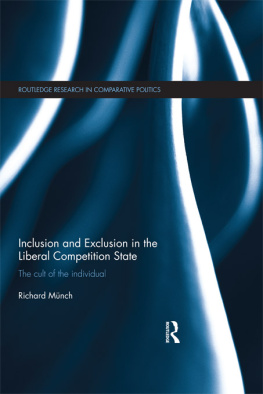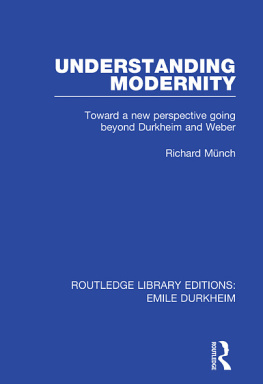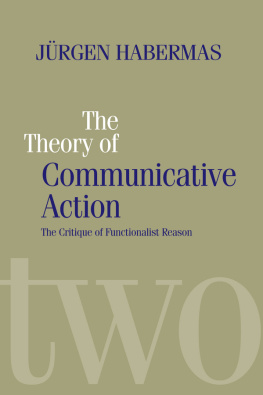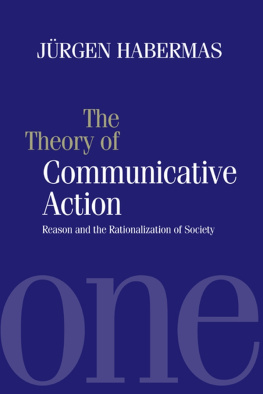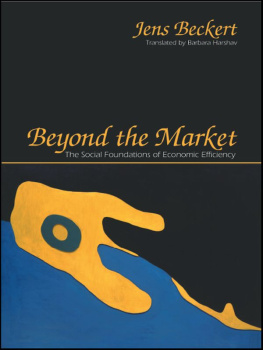First published in 1987 by
Routledge & Kegan Paul Ltd
11 New Fetter Lane, London EC4P 4EE
This edition published in the Taylor & Francis e-Library, 2010.
To purchase your own copy of this or any of Taylor & Francis or Routledges collection of thousands of eBooks please go to www.eBookstore.tandf.co.uk.
Published in the USA by
Routledge & Kegan Paul Inc.
in association with Methuen Inc.
29 West 35th Street, New York, NY 10001
Richard Mnch 1987
No part of this book may be reproduced in
any form without permission from the publisher
except for the quotation of brief passages
in criticism
Library of Congress Cataloging in Publication Data
Mnch, Richard, 1945
Theory of action.
(International library of sociology)
Bibliography: p.
Includes index.
1. Action theory. I. Title. II. Series
HM24.M84 1987 302 874972
British Library CIP Data also available
ISBN 0-203-83020-2 Master e-book ISBN
ISBN 0-7102-1218-6
Preface
Sociology, along with the other sciences of human action, cannot undergo further development solely by way of differentiation into specialized disciplines which are separated both in terms of subject matter and treatment, and in social terms. One needs only to recall the circumstances under which the discipline first emerged and grew to be aware that, if its further development is to be fruitful, more is needed than mere differentiation into coexisting directions, namely discussion, cooperation, and integration which retains any inherent tension. Neither a positivistic sociology, no longer aware of its own tradition and becoming absorbed in the blind collection of data or in empty theoretical formalism, nor an idealistic sociology rendered immobile by its backward-looking concern for its own classics, contenting itself with recounting everyday knowledge or flying high above the clouds in abstract developmental logic, represent in and of themselves approaches which can carry us farther forward. Any continuation of their mutul separation leads only to stagnation and the completion of ever more circles. Abstract positivistic or idealistic theory construction which neither takes account of the sociological tradition nor has empirical and/or historical relevance continually repeats the mistakes of the past. Positivistic empiricism and idealistic historicism make no progress beyond their own descriptions as repeatedly reapplied, and they draw no lessons from mistakes already made.
Modern science in general, and modern sociology in particular, owes its existence and the progress it has made not to the separation but to the integration of differing types of orientation. This book, together with its sequel, Understanding Modernity, is intended as a reminder of the conditions surrounding the creation and progress of sociology, and beyond it the sciences of human actiona reminder to serve as a basis for any further progress in the future. The tradition the book as a whole sets about renewing is that of the voluntaristic theory of action, the aim of which is to achieve a dialectical synthesis of the various directions of thought and methods of research. It will tap this tradition by rationally reconstructing the contributions of Talcott Parsons.
By rational reconstruction, I mean a reformulation and extension of the voluntaristic theory of action from the perspective of the present-day level of development. I have not therefore proceeded chronologically; instead, this book is devoted to an exposition of the voluntaristic theory of action as found in Talcott Parsonss work, which is then, in Understanding Modernity, used as the perspective from which to view a return to the contributions of Emile Durkheim and Max Weber.
The synthesis of differing orientations must not simply rest at the integration of different approaches, and of the theoretical and empirical aspects of sociology, but must reach beyond this individual discipline to seek links with the other sciences of human action. However, integration should on no account be misunderstood as the suppression of tensions. Rather, there is a need for precisely this tension-free coexistence to be overcome, and superseded by a position where the different forms of orientation mutually penetrate one another, not eliminating tension, but instead making it productive by generating scientific progress. This means that discussions ranging beyond the boundaries of each individual approach should be institutionalized, that we should cooperate in joint projects and work on a common frame of reference which maintains the vitality of the tensions between different orientations within an integrated system.
In attempting to help integrate opposing orientations to action theory in this way, my intention is also, as far as possible, to present the voluntaristic theory of action in a readable and teachable form. That the voluntaristic theorys contribution to knowledge is insufficiently institutionalized is due in no small measure to the often esoteric fashion in which it is presented. This does not, of course, mean that it can be reduced to the undiscerning level of everyday knowledge and language. Rather, one strives for comprehensibility, readiness to communicate, and actual communication, though such endeavours are inevitably less effective than one would wish.
Two of the chapters in this volume on the theory of action are based upon essays which had already been published. Even so, this is not simply a collection of essays. The individual pieces have been reworked from their initial versions, and the second chapter has been extended far beyond its original scope. These have been supplemented by new contributions to provide as coherent and logical a reconstruction of the theory of action as possible.
The various chapters in the current volume were written over the space of five years during intermissions to more comprehensive undertakings on evolution, societal institutionalization, and the institutional specification of modern normative culture. These studies have now appeared in German in two books: Die Struktur der Moderne (The Structure of Modernity) and Die Kultur der Moderne (The Culture of Modernity). The empirical and historical outlines contained in the theoretical sections of this book are further elaborated in the above works. For the present, the foremost interest is in the theoretical perspective; empirical and historical interests are channelled into the later works. The development of the perspective in this theoretical contribution has been fundamentally influenced by practical work using the frame of reference of voluntaristic action theory. This is particularly true of the underlying Kantian perspective and of the theory of interpenetration, which crystallized in the course of an investigation into the birth of modern science. The effect was compounded because empirical/historical questions posed were continually tied back in to the discussion of problems on the theoretical level. It is essential to fruitful scientific work to proceed in such a way that theoretical and empirical/historical considerations can mutually penetrate each other and cross-fertilize.


